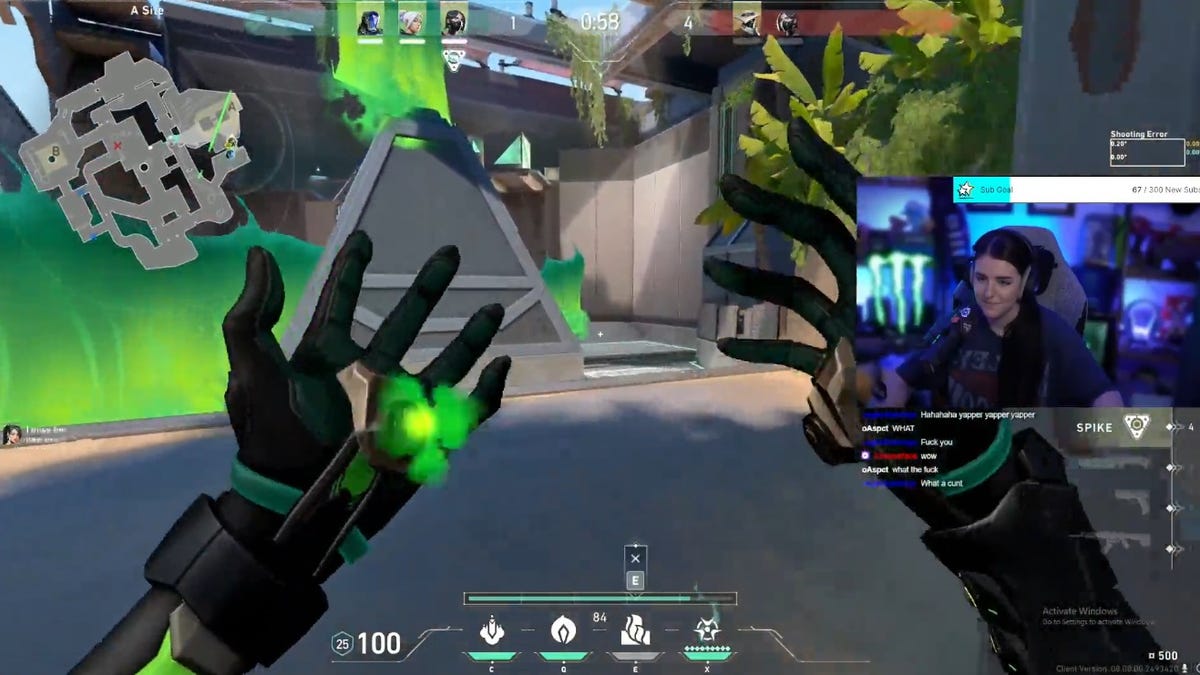Everyone who’s ever played an online game with voice chat has probably experienced something that made them never want to do so again. Toxicity in online games, especially in shooters and other competitive genres, can feel as ingrained and immutable as bad weather. Companies keep saying they’re working hard on fixing it, but some of the worst things you’ll ever hear come out of another human being’s mouth still happen in them.
Meet The Filmmaker Behind This Legend of Zelda Speedrunning Documentary
Twitch streamer Taylor Morgan was playing the popular hero shooter Valorant when a random teammate she’d been matched with threatened to rape her. “Be honest with me,” the player says, “do you know what rape feels like?”
“Are you saying you’re gonna rape me,” Morgan asked, to which the online stranger replied, “You’re going down the right path.” He continued, “It’s not rape if I like it, is it now.”
The streamer clipped the exchange and posted it to social media on May 13 where it went viral, leaving a ripple of shocked and horrified fans and developers in its wake. “I have never made a more desperate plea than what I am about to say right now,” Morgan wrote in a tweet tagging Riot Games, the maker of Valorant, and its support channel. “I need you guys to fucking do something. I am an incredibly strong person and I have been streaming for a very, very long time. But absolutely nothing prepares you for someone saying this to you.”
Morgan went on to argue that account suspensions aren’t enough to combat behavior like this, and called for hardware-level bans that would keep toxic players from continuing to play. “If this goes unpunished I am taking this as an active act from you that you do not give a single fuck about any of the women and minorities that play your game, and I will rally to boycott,” her tweet continued. Later, after leaving the match in question, she received an AFK penalty from Riot games for disconnecting. “Teamwork and respect are essential,” it read in a notice that required her to click “acknowledge.”
Responses poured in on social media in the aftermath of the exchange. “This Andru Tayte mentality can go fuck itself into oblivion,” wrote Baldur’s Gate III’s Halsin voice actor, Dave Jones. “The toxic players you tolerate are costing you billions of dollars a year,” wrote Cornerstone Studios CEO and art director on Psychonauts 2, Lisette Titre-Montgomery. “True story. I had a group of women show me what happened to them in Halo 2 because of proximity chat, we cut it from Halo 3 the next day,” wrote Jaime Griesemer, creative director at Highwire Games and a former design lead at Bungie.
But that response was far from unanimous. Plenty of other online users tried to defend the remarks, claim they weren’t that bad, or argued that the streamer should have just shrugged them off. “Women are so fragile. Just banter back and top frag,” read one heavily-upvoted response by someone with “incel and proud” in their bio. “If you can’t stand the heat, get out of the kitchen. Stop invading men’s spaces,” read another.
“Taylor, I’m so sorry you had to experience this,” Valorant’s executive producer, Anna Dolan, tweeted back the next day. “We’re taking actions against this account, but I also know that’s not enough. Our teams are always working on our behavior tools, but we have room to improve…and we will. I know we’ve never met—I hope we can fix that at some point—and you don’t have any reason to believe me, but I promise this means a lot to us and is a big priority.”
One player in the thread asked Dolan if Morgan’s call for hardware-level bans would be one of those tools. “We’ve actually considered this approach,” she said. “There are some complexities we’re navigating, but it is for sure an option in the future.”
A spokesperson for Riot Games told Kotaku in an email that the AFK penalty against Taylor has since been lifted, and that the company will be taking action “against the egregious behavior in the video.”
“We’re constantly evaluating our internal systems to move swiftly against disruptive behavior,” they wrote. “As much as we invest in them, unfortunately our systems will never catch everything so we have to be willing and ready to take corrective action manually when needed.”
One mechanism for clamping down on toxic speech in online gaming could be AI related. Microsoft has been using generative-AI to try to more quickly identify and sanction behavior on Xbox that violates its terms. Microsoft announced last year that it would use a new voice reporting feature to issue up to eight strikes against players before eventually banning their accounts. “Since its launch, 138k voice records have been captured utilizing our ‘capture now, report later’ system,” the company wrote in a new transparency report released today. “When those reports resulted in an Enforcement Strike, 98% of players showed improvement in their behavior and did not receive subsequent enforcements.”
Of course, even those tools still rely on players’ proactively submitting reports of voice clips. It’s unclear what percentage of people who experience toxic voice chat in games like Call of Duty: Modern Warfare 3 or Overwatch 2 actually do that. No doubt some just instantly mute team chat and never turn it back on, while others simply log off altogether and don’t bother coming back.
